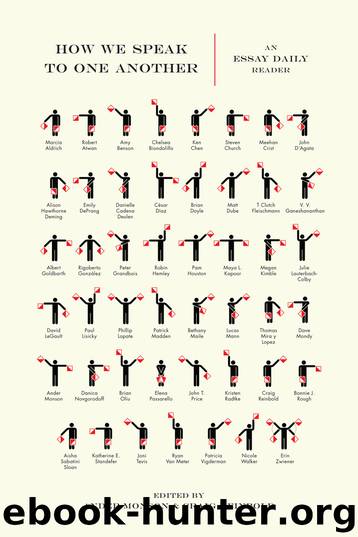How We Speak to One Another by Ander Monson

Author:Ander Monson
Language: eng
Format: epub
ISBN: 9781566894586
Publisher: Coffee House Press
Published: 2016-12-11T16:00:00+00:00
Over the years I travelled to another universe. However alert we are, however much we think we know what will happen, antiquity remains an unknown, unanticipated galaxy. It is alien, and old people are a separate form of life. They have green skin, with two heads that sprout antennae. They can be pleasant, they can be annoying—in the supermarket, these old ladies won’t get out of my way—but most important they are permanently other. When we turn eighty, we understand that we are extraterrestrial.
How sly is this sentiment: we don’t become extraterrestrial, but we understand ourselves as such, which implies that others might have been understanding or seeing us like this long before we came around to such a viewpoint. This works because it’s true and not true (the elderly are not aliens but they can have greenish skin, extra [sort of] heads, and most definitely strange protuberances) and because it both extends distance (by speaking of extraterrestrials and outer space) and collapses it in Hall’s honesty about his own condition, his own old age, his own body.
This capacity for subtle surprise pervades the essay. “Cornflowers bloom,” Hall writes near the end, describing his landscape. Here is another great word choice—cornflowers are blue, and so how much more important does that verb become, how much more connotation and suggestion does he get by pairing it with a cornflower instead of, say, a daffodil. He claims, “New poems no longer come to me, with their prodigies of metaphor and assonance. Prose endures.” New poems might no longer arrive, but that assonance is surely there—even in the sentence where he doubts its place (“poems” and “no,” “me” and “prodigies”). And then there is metaphor. For the duration of the essay, Hall sits and looks out at his barn. As he traces its history, I do not realize till the essay’s end that this barn, its age, its past, runs concurrent with him. That it is, in fact, him: “Over eighty years, it has changed from a working barn to a barn for looking at.” That’s the thing about Hall’s metaphor, his prose in general: it is so quiet yet so in command that, like a hushed train trip at dawn, you do not realize you have reached your destination until you are already there. And while that destination—an essay’s end, a life’s end—may be both necessary and undesired, it at least leaves you with nowhere to go but walking up, through a turnstile and into daylight.
Download
This site does not store any files on its server. We only index and link to content provided by other sites. Please contact the content providers to delete copyright contents if any and email us, we'll remove relevant links or contents immediately.
| Diaries & Journals | Essays |
| Letters | Speeches |
The Rules Do Not Apply by Ariel Levy(4966)
Bluets by Maggie Nelson(4555)
Too Much and Not the Mood by Durga Chew-Bose(4347)
Pre-Suasion: A Revolutionary Way to Influence and Persuade by Robert Cialdini(4232)
The Motorcycle Diaries by Ernesto Che Guevara(4098)
Walking by Henry David Thoreau(3961)
Schaum's Quick Guide to Writing Great Short Stories by Margaret Lucke(3380)
The Daily Stoic by Holiday Ryan & Hanselman Stephen(3317)
What If This Were Enough? by Heather Havrilesky(3311)
The Day I Stopped Drinking Milk by Sudha Murty(3197)
The Social Psychology of Inequality by Unknown(3029)
Why I Write by George Orwell(2951)
Letters From a Stoic by Seneca(2797)
A Short History of Nearly Everything by Bryson Bill(2698)
A Burst of Light by Audre Lorde(2606)
Insomniac City by Bill Hayes(2555)
Feel Free by Zadie Smith(2479)
Upstream by Mary Oliver(2389)
Miami by Joan Didion(2367)
